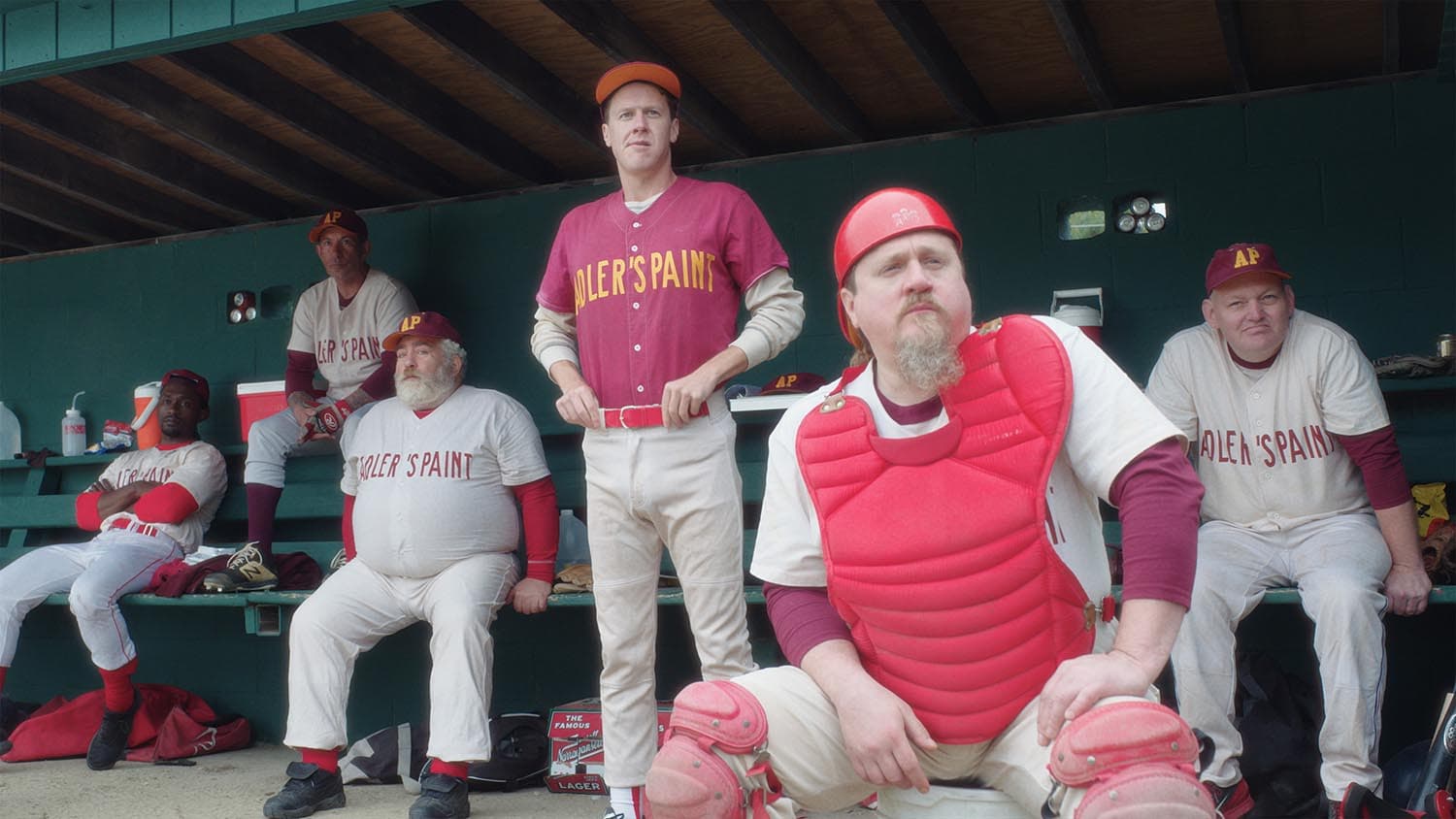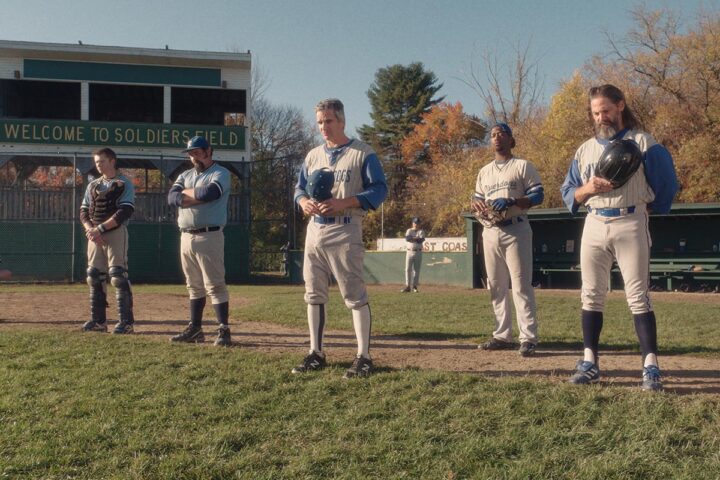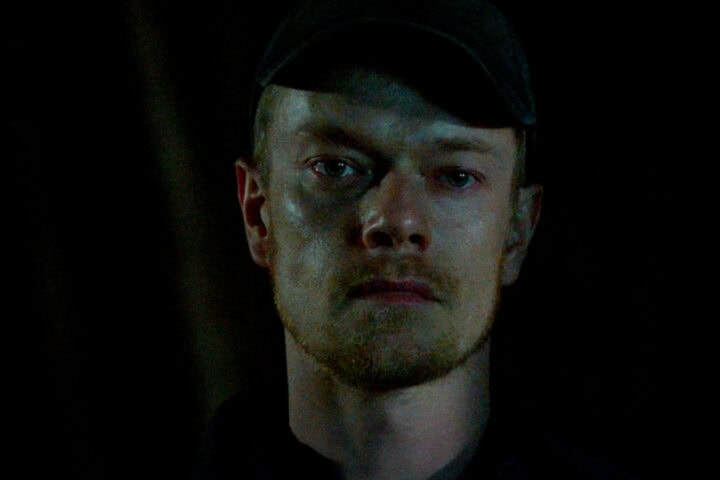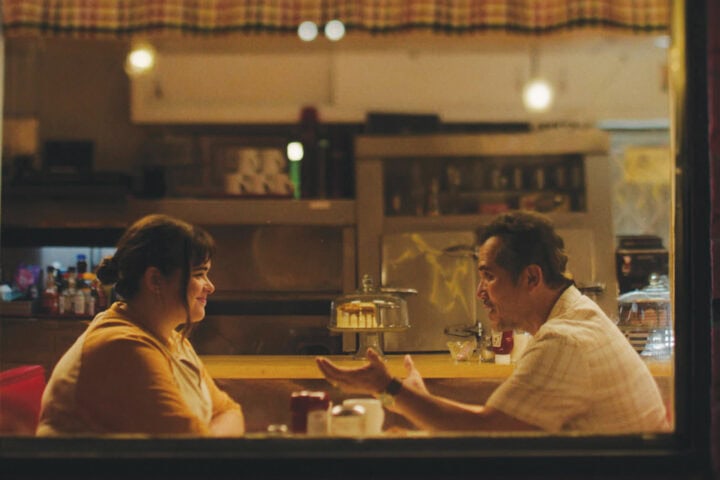“The eephus pitch is a type of curveball so unnaturally slow that it confuses the batter—makes him lose track of time,” explains Nate Fisher’s Merritt Nettles in Carson Lund’s Eephus. This pitch perfectly describes Lund’s winning filmmaking strategy. That’s not to say his depiction of a recreational baseball game in Eephus is unnatural or slow—only that Lund manipulates time in a way that accentuates our awareness of his manipulating its passage.
With equal parts wittiness and wistfulness, Eephus chronicles the final game at an ordinary recreational baseball field in New England. Two multigenerational teams of men gather for one last outing of community, conviviality, and a little healthy competition over nine innings of baseball. It’s less a hangout movie as it is a hanging-on movie, what with all the players finding ways to prolong the game and linger in the comforting ritual.
Lund, whose background resides in cinematography (as well as film criticism), steps confidently into directing with his debut feature. Within the familiar framework of a sporting event, Eephus epitomizes what he and his creative partner in Omnes Films, Tyler Taormina, dub the “ecosystem film.” This pointillistic collection of personal details from around the baseball field coalesces into a portrait of something more than its participants. The film, with gentle grandiosity, captures the experience of time itself as circumscribed by a physical space laden with deep meaning for all those who converge upon it for a farewell outing.
I spoke with Lund prior to the theatrical release of Eephus. Our conversation covered how the legacy of baseball movies influenced the film, why he didn’t need to spell out the subtext underneath the teams’ systems of coded language, and where his background in film criticism came into play in the production process.
Back in 2016, you wrote about Richard Linklater’s Everybody Wants Some!! for this site: “This is clearly a case of a filmmaker so in love with a milieu […] that he’s willing to see it only in its best light.” Eephus shows your clear love of its milieu, but I wouldn’t necessarily say you view it through rose-colored glasses. How did you arrive at your point of view in this specific world of baseball?
I’ve had a shifting relationship to baseball throughout my life, and that’s the root of it. I grew up in a very competitive context, intensely playing in traveling leagues, and really immersing myself in it to a degree that became exhausting. I grew alienated from that whole community and the toxicity and pressure of it. So I left the sport for quite a while, and I came back to it as an adult in California and realized that I could actually love the sport again because it wasn’t about people trying to make it to some next level. It was just about enjoying the time and passion that all these people share together and also just creating a version of yourself on that field with your teammates that you don’t have somewhere else in your life. So I found the love again.
But I’m still able to see that especially where I’m from, and having observed the leagues that my dad plays in, there’s a real over-infatuation with a game like this. That can result in a very closed-off or repressed personality where you’re only speaking through the lingo of the game, euphemisms, put-downs, shorthand, and competitive banter. It may come from a place of genuine enjoyment and trying to tap into some childlike feeling, but ultimately, it’s expressing itself through a toxic lens. I also recognize that, generally speaking, to be involved in a recreational activity like this is just a genuinely healthy thing for anyone…even if it results in unhealthy habits. I think getting away from the stresses of daily life and things we don’t want to do to be able to do this thing we do want to do is good. I’m pulling from many different people I’ve seen and played with over the years, and I wanted to get all those different shades.
Do you find some of that competitiveness antithetical to the essence of baseball? Even though we call it America’s pastime, it cuts against the grain of an outcome-driven game with a relentless forward motion that defines so many other sports. Baseball is just as much about lingering in the time.
It’s experiential. The film becomes more about men trying to stretch this game on as long as possible and not worrying about the outcome. Once the umpire leaves and there’s no authority figure anymore, it becomes like a democracy—albeit one still steeped in all this tension, frustration, and lingering melancholy that gets expressed through the game. But I think they’re not worried about the outcome. They’re worried about the loss of this thing that they all do.
I do think, because of baseball’s elongated nature and even the length of a season, the winning isn’t the only thing. A single game sort of falls off into irrelevance. It’s about honing your skills every day and trying to be the best version of yourself. Yes, it’s a team sport, but it’s also a very individualistic sport, so it really does embody American values in a lot of ways in that sense of this push between the democratic collective idea and then the individual. That’s ultimately what I felt over the years: this over-emphasis on winning and intra-squad competitiveness was ruining the real spirit, which is just the hangout quality of it.

You’ve talked about preferring films where dialogue is more of a mask over what’s really happening. Baseball naturally comes with a lot of coded language and jargon, but when it came to executing this in Eephus, how much of the true meaning needed to be spelled out for everyone?
I would say that only 20% of the time I would have to go back in and explain the subtext of a scene. It really was coming through in the script, and when I spoke with the actors originally, I got a sense that they really understood it. I specifically cast actors who had some experience playing on a team, baseball or otherwise. I wanted to attract a cast that had this attachment to the game, whether they played recently or not. Somewhere in their past, this game was important to them. Because I think when you play on a field, what you’re doing is tapping into a childhood version of yourself. [Being] with the same group of people for a month straight, they would understand the teamwork dynamic that the film’s trying to evoke.
That’s why I put them all together. I didn’t make the schedule in such a way that someone would only come for a couple of days, leave, and then come back. I wanted everyone there the whole time, [so they would] really feel like a part of it and tap into those memories they had. [Baseball] and baseball movies are such a part of our culture, and that mythic public imagination swirled around us while we were shooting. That’s why there are Field of Dreams references in the film, and I didn’t even intend that. It just kind of happened! I think people really understood what was going on, but they didn’t overplay the subtext either. I made that clear. I was like, “I think it’s all there, and the viewer will pick up on it. You just have to play this like any other Sunday, because what the characters want is for it to feel like any other Sunday.”
The story of Eephus started as a box score. How were you and your co-writers, Michael Basta and Nate Fisher, moving beyond the game’s minutiae to unlock the experiential dimensions that you do?
That’s a bit of a “print the legend” situation. I might have said something to that effect, but I meant it was there from the beginning, and we wrote the script in tandem. I think we probably finished the box score before we finished writing the script, but sure, we can go with the legend!
The box score was a very handy way for us to divide the time up in the game. We understand, “Okay, a game is nine innings, and there are three outs per half inning. How do we spend our time in that?” It’s a very structuralist concept of figuring out how to partition the attention in a narrative sense. It’s very unorthodox for omnibus storytelling. We knew that we didn’t want to just make a film about the game itself or about the sport, and it would have been a much harder film to shoot to have this continuous sense of the action on the field.
I wanted this to be about the whole event, the whole ritual. And the people that come and watch, the people that sit in the dugout. And the trees themselves, the clouds passing over. The field itself and the land it’s on, it’s all the stage for us, and we have the freedom to move around that stage. The only rule we set for ourselves was we shouldn’t leave the field at any point. We can go to the woods, but not too far into the woods and come back.
The three of us wrote this as a group, and we always felt like we had some escape hatch. If we felt this isn’t moving here or there’s not enough momentum with this character, [we’d ask], “Who have we not spent time with in a while? Let’s go over there. Let’s go to this team because we just spent a lot of time with that other team. Let’s go to the sidelines and spend some time with this character.” That sounds slapdash, or like we’re throwing ideas against the wall. But as we went through it, we were always assessing balance and trying to achieve this zen state. It wasn’t entirely about equity between all the different characters, but it was a feeling of balance between the different elements: the baseball action, the camaraderie in the dugout, the observational detachment, and then the nature imagery.

Maybe it’s because I’m deep in the retrospective about Frederick Wiseman, who appears as a voice in Eephus, but I couldn’t help but notice some similarities between his work and the ecosystem film that you and Tyler Taormina love to work within. What have you learned from Wiseman as a filmmaker?
I think Wiseman is one of the masters of that form. It’s interesting because Tyler isn’t as familiar with Wiseman, but I arrived at him through thinking about how can I make a narrative film that’s so indebted to Wiseman. The whole approach of his work is to pick a community that is interesting. Sometimes, it’s even like he’s dying to make a film about that location; it’s just the location that was presented to him. That initial neutrality is quite interesting because he goes in there, finds something, and unpacks it. He has such a restless curiosity that he finds all the details that are worth seeing—all the different layers of power and dynamics between this large group of people. He just sees how this whole organism works, and the logic of it is the location or the infrastructure. Spatially, that’s what defines it, and that was a big influence for me.
Especially in recent years, I think his films have this fascinating ability to just accrue so much detail to the point that you feel like it’s passive observation. But as the film goes on, it gains detail and gets longer. By the end, it achieves this incredible melancholy. I think it’s one of his magic tricks, and I see it in Monrovia, Indiana and Menus-Plaisirs. I really wanted to have that same emotional trajectory—this feeling of bombarding the viewer with a lot to take in about this world that they didn’t understand prior. They feel like they’re vicariously living it, but by the end, they’re suddenly feeling all very melancholic and don’t quite know how we got there when it started in such a buoyant manner. I’ve been trying to really unpack Wiseman’s films and how he does that. I haven’t quite figured it out yet, but I tried to do that with Eephus.
He’s got 60 years on us, so there’s time.
Life experience does that!
You mentioned that Field of Dreams organically arose as a reference. Do you see these baseball movies as so steeped in the culture that the characters wouldn’t even recognize it as quoting the movie? I’m curious about how you arrived at the more direct allusion to the Gary Cooper speech in The Pride of the Yankees and how it seems to trail off into what feels like a winking nod to The Graduate.
No, it’s not [a nod], but this is great. It’s all part of this national consciousness that we all have just from this culture having been a part of our lives for so long. It’s more about the Gary Cooper speech as a thing that’s permeated culture, not a Pride of the Yankees reference. But to be honest, that wasn’t an idea that was in the initial script. That’s my actor, Cliff Blake, coming up with it on the spot. He brought so much research to this character, and he even brought his own props. Throughout the game, even if we weren’t shooting him, he’d be taking notes, keeping his own box score, and writing quotations. It was really intense method acting! He had this idea to just start peppering in quotes throughout the film, and that’s what ultimately led to that chapter structure where he says a quote from a famous baseball player of the past.
The Gary quote happened in the shot where he’s looking out from the press box over the field, that’s the first time he said that. It was so beautiful because you could see the breath dissipating into the air as he said it. I loved that moment so much, and I felt it spoke so much to the character as someone who actually derived real pleasure from being a part of this, even if it is ending. He was a contrast to everyone else who was stuck in all this bitterness. So we shot that scene, and then I said, “Okay, we have to shoot a scene at the beginning now where he says that to bookend the film.” But when he says it at the beginning, I wanted it to have a whole different tone and context. It’s more of a comedy beat than something filled with all this pathos.
How does your critical background interact with your filmmaking? Can you bring in that analytical thinking, or do you have to compartmentalize it?
It’s hard for me to self-analyze like that. It’s so part of my language that I don’t know if I compartmentalize it, but I’ve always considered criticism and filmmaking to be in conversation with each other. I started writing about films because I wanted to understand them deeper, hone my taste, and understand what attracts me to the art form. I don’t think I’ve stopped writing criticism. I would like to continue; it’s just that I’ve been very busy. I think it’s important to continue so that I can keep honing that taste and not feel like I’m stuck at this one spot.
I definitely try to internalize all these influences ahead of time and not be overly referential on set. The references are for the prep period, and we spent a lot of time between myself, my cinematographer, and other department heads just talking through influences and looking at films. But then, when we got to set, we didn’t want to talk about that anymore because we had already figured out the aesthetic and the tensions of the film. It becomes very practical on set. You just have to make your day, finish the scene, and move on. And there are so many people there relying on you and expecting immediate answers from you. All those answers are just very practical. Maybe sometimes critical language slips in, but that’s just who I am, I guess. [laughs]
Since 2001, we've brought you uncompromising, candid takes on the world of film, music, television, video games, theater, and more. Independently owned and operated publications like Slant have been hit hard in recent years, but we’re committed to keeping our content free and accessible—meaning no paywalls or fees.
If you like what we do, please consider subscribing to our Patreon or making a donation.




